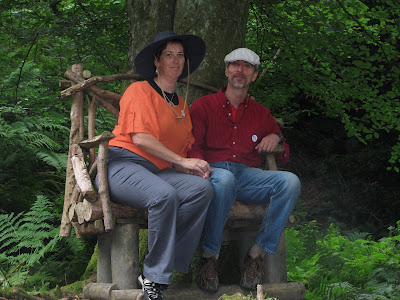A bit over 23 years ago, a friend introduced me to a woman she'd known since they were toddlers together. I was recovering from an unpleasant divorce, trying to adjust to being a single dad, and (honestly) was pretty lonely. The friend told me we'd get along great -- mutual interests in music, birdwatching, gardening, and travel.
"Two such similar people should definitely get to know each other," she said.
Despite the fact that even on a good day, I raise social awkwardness to the level of performance art, I got up my gumption, called her up, and asked her out. Sure enough, we hit it off brilliantly. That summer, we went with some friends on a three-week trip to Iceland. After a few more adventures big and small, we decided to make it permanent. We're still together.
And our friend was right; we are really similar. We nearly finish each other's sentences sometimes. And I can't keep track of the number of times one of us has said something random, and the other has responded in shock, "I was just going to say that."
Some new research out of Boston University suggests a reason why the old adage of "opposites attract" might not be that accurate. We're attracted to people who are like us, usually (at least at first) about one or two standout traits -- like birdwatching and gardening -- because of self-essentialist reasoning. This is the idea that our core being is shaped by our passions and our dislikes, and when we find someone who resonates with us on some of those, we assume they'll share our other personality traits, as well.
That we'll be "soulmates."
"If we had to come up with an image of our sense of self, it would be this nugget, an almost magical core inside that emanates out and causes what we can see and observe about people and ourselves," said Charles Chu, who co-authored the study. "We argue that believing people have an underlying essence allows us to assume or infer that when we see someone who shares a single characteristic, they must share my entire deeply rooted essence, as well."The problem is, that thinking has a flaw. You can share one or two deep connections, and still be different on a whole lot of other things, including some important ones -- maybe even some that are deal-breakers. "We are all so complex," Chu said. "But we only have full insight into our own thoughts and feelings, and the minds of others are often a mystery to us. What this work suggests is that we often fill in the blanks of others' minds with our own sense of self and that can sometimes lead us into some unwarranted assumptions."
With Carol and me, for example, there's the still-baffling disconnect we have over books. With a very few exceptions -- The Hitchhiker's Guide to the Galaxy is one, and the Discworld novels of Terry Pratchett -- I can nearly guarantee that if I love a book, she won't, and vice-versa. Even with authors we both like (for example, Christopher Moore), we don't resonate with the same books. She loved Fluke and I thought it was too weird and implausible, even by Moore's standards, to work; I found Coyote Blue brilliant and it's probably her least favorite of Moore's books. (At least we agree on A Dirty Job and its sequel, Secondhand Souls, which are flat-out genius.)
Fortunately, the fact that Carol thinks my all-time favorite book, Umberto Eco's Foucault's Pendulum, is a total snooze-fest wasn't enough to make either of us reconsider our choice in a partner. I can't imagine how hard it must be to click with someone over one thing, and then find that there are deep and irreconcilable differences in something potentially divisive, such as politics, religion, or morality. But even so, it's worth getting past our tendency to self-essentialist reasoning. After all, it's when we encounter, and stay connected with, people who aren't like us that we tend to learn the most. That applies to friends as well as romantic liaisons; one of my best friends, the wonderful author Gil Miller (speaking of books you definitely need to read, you should check his out as soon as you're done reading this) is pretty different from me in a lot of ways, but we've formed a close friendship founded on a deep mutual respect and an understanding that both of us base our beliefs on thoughtful consideration -- and are willing to entertain the possibility of changing our minds.
And maybe that's what it boils down to; respect, willingness to listen, and an understanding that we might actually not be right about everything. As author Robert Fulghum put it, "Don't believe everything you think."
In any case, the recent research does shed some light about how connections form in the first place. The mutual friend who introduced Carol and me certainly got it spot-on. And even if we can't agree about what books to read, it's good to know we still have lots in common, 23 years later.
****************************************




